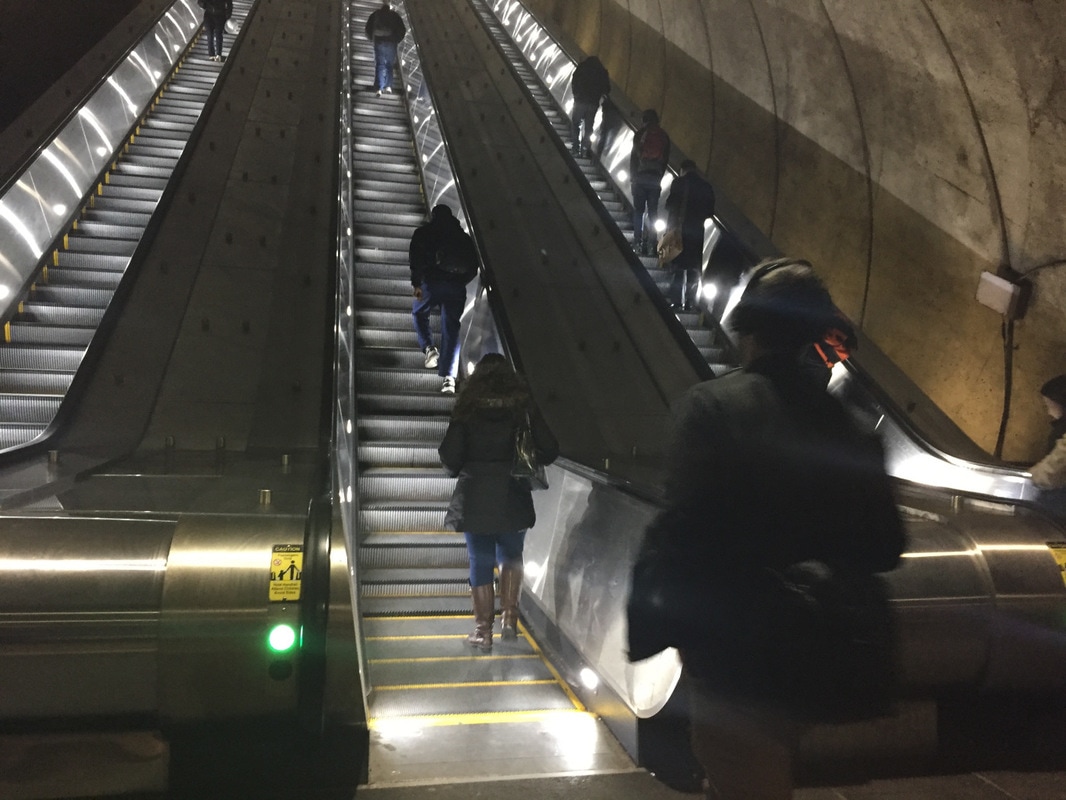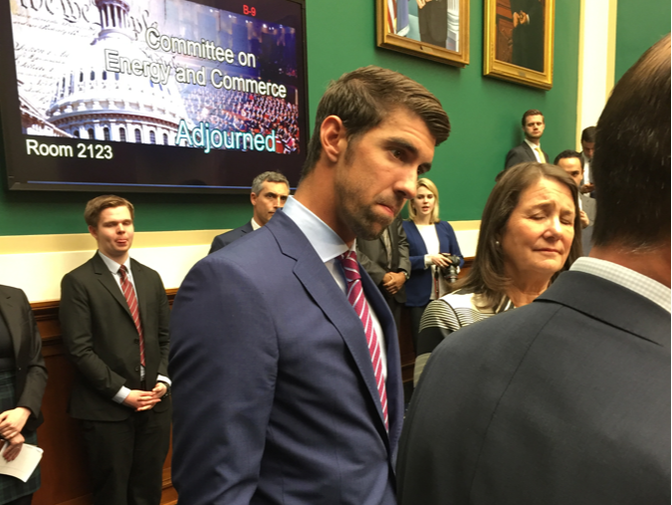|
By Aubrey Gelpieryn
American University WASHINGTON – As part of the multi-million dollar project to amp up the Washington Metro, new escalators were opened to the public on Wednesday at the Bethesda station. According to Bethesda Station Manager S. Kelly, before the three new escalators were installed, there were only two that worked- one that went up, and one that went down. The newly installed escalators also featured speakers that projected safety instructions. Kelly said that she’s noticed a big difference since the new escalators have been installed, and that it’s quicker for people who commute using the Metro now that they have two elevators that go up. “It’s much better now– very much better,” said Kelly. Kelly also said that it sometimes got “really busy” when the construction was taking place to put the new ones in. According to Washington Metropolitan Area Transit Authority’s website, the Bethesda’s entrance escalators, which are are 212 feet long, are the second longest in the Metrorail system and among the longest in the Western Hemisphere. It cost $8.4 million to replace the three escalators at the entrance; the previous ones had been in use since the station opened in 1984. For some of the Bethesda Metro commuters, however, the new installment didn’t seem too important. Lily Asrat, who said she rides the Metro to and from the Bethesda station every day, wasn’t even aware of the change. While she said she noticed the construction while it was happening it never really impacted her commute; she didn’t take note that the escalators had been replaced until it was specifically pointed out to her. “I didn’t notice it, so that says something,” said Asrat, She added, however, that she thinks it’s important for the city to continue to invest in improving transportation and the Metro in order to maintain reliable public transportation. Another metro rider, Leigh Rieder, said this was actually the first time since 2010, when she moved away from Washington, that she was riding on the Metro again. While she noted that the new escalators were “worth it to so many people who live in the area,” the first thing she noticed when she arrived at the station was actually that the station seemed more confusing than she remembered. “I’ve been using the Metro system for many, many years now, and I yet I couldn’t quite figure out where I was going,” said Rieder. Rieder said that the most confusing part was all of the signage around the station, most of which related to shutdowns and restricted access across the different Metro stations. These shutdowns are part of a greater effort to improve the public transportation system across Washington. According to a statement made by the agency, “Metro is in the middle of a $151 million plan to replace more than 130 escalators by the end of the decade.” The next stations where riders can expect to see new escalators are Friendship Heights and Medical Center, according to WTOP.
0 Comments
By Aubrey Gelpieryn
American University WASHINGTON – Michael Phelps sat before the House Subcommittee on Oversight and Investigations Tuesday morning and told the Representatives that he didn’t think he’d ever participated in a “clean” Olympic Games. Phelps, who retired from swimming after winning his 28th medal in the Rio de Janeiro Games this past summer, shared a personal testimony of his experiences having known other athletes were using drugs to gain a competitive advantage. Though he had previously avoided talking about the subject, Phelps said that his newborn son is what inspired him to finally step forward and share his criticism of performance-enhancing drugs and why he never felt the need to partake in doping. “I put my body through pain that I’ll never see again, trust me. But it just needs to be fair,” said Phelps. For me, having a son, I want him to enjoy clean, fair sport.” A panel of witnesses, that included shot-putter and Olympic gold medalist Adam Nelson, United States Anti-Doping Agency Chief Executive Officer Travis Tygart, World Anti-Doping Agency Deputy Director General Rob Koehler and IOC Medical and Scientific Director Dr. Richard Budgett, joined Phelps as witnesses. The subject of anti-doping was particularly personal for Nelson. He was awarded his gold medal nine years after competing in the Olympics, when it was revealed that the competitor who had bested him did so with the assistance of performance-enhancing drugs. His gold medal, which he showed to the members of congress, was not given to him on the Olympic podium, but in an airport food court. After talking to congress, Nelson was ready for action to take place. “I think the first next step is for the IOC and WADA to actually follow up on what they talked about today. The fact that the IOC representative said that they’re going to consider separating sport from this particular element is a really big step,” said Nelson. “I’ve had the opportunity to represent my country in competitions all over the world, but to have the opportunity to come and represent clean sports in this particular venue is an element that you just don’t get to do very often.” Nelson said he hopes that “major changes” will result from this hearing. Subcommittee Chairman Rep. Tim Murphy. R-PA., said the hearing was important because it sent a message to American youths. “Sports should be a place where your determination and your skill, your focus, your psychosocial makeup are things that are the difference between a champion and just a competer,” said Murphy “Drugs should not be a part of it.” The topic of anti-dopoing is especially relevant after this past summer’s Olympics, during which time 68 Russian athletes were banned from competing due to positive tests, according to the BBC. Phelps described this incident as “frustrating.” He said that while he was tested 13 times in the six months leading up to the 2016 Games, sometimes being woken up at 6 a.m. on his off days to complete a test, athletes from other countries were allowed to participate even after testing positive twice. |
Aubrey GelpierynAubrey Gelpieryn is a journalist currently in New York. She enjoys writing about music, politics and current events. Archives
January 2021
Categories
All
|



 RSS Feed
RSS Feed